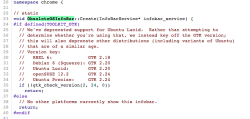Chrome stops declaring Linux systems obsolete

![]() Chrome and Chromium's GTK detection code stands in for operating system detection
Badly chosen warning messages caused some consternation with Google recently as its Chrome browser began declaring supported Linux systems such as Red Hat Enterprise Linux 6 obsolete. The problem was brought to public attention by Red Hat evangelist Jan Wildeboer in a Google+ posting when his browser announced "Google Chrome is no longer updating because your operating system is obsolete".
Chrome and Chromium's GTK detection code stands in for operating system detection
Badly chosen warning messages caused some consternation with Google recently as its Chrome browser began declaring supported Linux systems such as Red Hat Enterprise Linux 6 obsolete. The problem was brought to public attention by Red Hat evangelist Jan Wildeboer in a Google+ posting when his browser announced "Google Chrome is no longer updating because your operating system is obsolete".
In the ensuing investigations, François Beaufort noted that the Chrome source code revealed more details about how Google worked out whether an operating system was supported – by checking the version of GTK installed. If an operating system had a GTK version earlier than 2.24, such as RHEL 6's 2.18, and Ubuntu Lucid 10.04 LTS and Debian 6's 2.20, then the system was marked as deprecated. It appears that the Google engineers had decided to use the GTK version as a proxy for the operating system version.
Google has been raising the build requirements of Chromium, the open source browser – and Chrome, their own browser based on Chromium – so that it needs a C++11 capable compiler such as GCC 4.6 or later. This means that, as of Chrome 26, there will be no more updates for Chrome on systems that can't support GCC 4.6 or later. For RHEL 6, it is possible to use a later compiler; the most recent release of Red Hat Developer Toolset 1.1 from January, includes GCC 4.7.2, but as the GTK version is used as an alternative to OS and compiler detection, if Google built the current Chrome with Red Hat's latest compiler, users would see the warning displayed.
The message is now being changed to "Google Chrome has stopped updating and no longer supports this version of your operating system". But this change doesn't alter the fact that various Chrome users on Linux will see updates stop for Chrome on their particular systems. The bug report notes "We're going to be showing this on a number of Linux versions that won't be supported as of Chrome 27".
Chrome will not, of course, stop working, but browsers are regularly patched for security flaws and most updates tend to include one or more security fixes; without updates, Chrome installations will become more vulnerable to attack. It is possible that Google will add a more nuanced OS detection mechanism to Chrome and create RHEL 6 builds which are updated, but no plan to engage in this course of action has been announced.
(djwm)
![Kernel Log: Coming in 3.10 (Part 3) [--] Infrastructure](/imgs/43/1/0/4/2/6/7/2/comingin310_4_kicker-4977194bfb0de0d7.png)

![Kernel Log: Coming in 3.10 (Part 3) [--] Infrastructure](/imgs/43/1/0/4/2/3/2/3/comingin310_3_kicker-151cd7b9e9660f05.png)
















